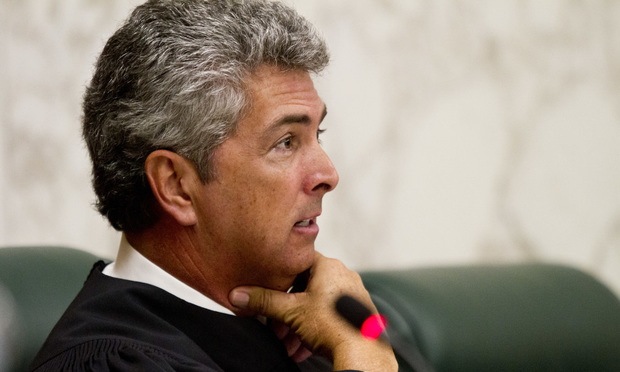Supreme Court Tosses Cellphone Evidence in Former Emory Law Student's Murder Trial
The Supreme Court of Georgia said police and prosecutors waited too long to obtain search warrants for data on electronic devices they had held in custody for more than a year.
March 11, 2019 at 02:41 PM
5 minute read
 Georgia Supreme Court and Court of Appeals Building. (Photo: John Disney/ALM)
Georgia Supreme Court and Court of Appeals Building. (Photo: John Disney/ALM)
The Supreme Court of Georgia has unanimously affirmed the suppression of evidence obtained from the mobile phones and other electronic devices of a former law student charged with murder in the death of a foster child.
In an opinion handed down Monday, the high court agreed with a trial judge who last year suppressed the electronic evidence because of the “unreasonable delay” in obtaining search warrants for communications and other information from the seized mobile phones and computers. The devices belong to defendants Jennifer Rosenbaum, who was a third-year law student at Emory University when she was arrested, and her husband, Joseph Rosenbaum, according to prosecutors' appellate brief.
Both Rosenbaums have pleaded not guilty.
Before her arrest, Jennifer Rosenbaum interned at the Henry County Juvenile Court, with the Henry County district attorney and at the Georgia General Assembly, according to news reports. She also was a candidate for the Henry County Commission, prosecutors said in their brief. Joseph Rosenbaum was a correctional officer at the Spalding County Correctional Institute.
Monday's ruling, written by Justice Michael Boggs, marks the first time a Georgia appellate court has considered whether a defendant's constitutional rights are violated by delays in obtaining search warrants for data contained in electronic devices seized in a warrantless yet legal manner by police. But the U.S. Court of Appeals for the Eleventh Circuit in Atlanta has issued a number of opinions over the question of unreasonable delay, which the Georgia high court adopted as “persuasive authority.”
Boggs said the state “made no showing of particular complexity, difficulty in drafting the warrant or competing demands on a limited number of officers” to explain a delay of more than 500 days to obtained warrants to review data on the Rosenbaums' devices. The last of seven warrants to search the devices was not secured until nearly two years after the couple's arrest.
“Instead, the trial court found multiple errors, failures, and oversights on the part of the state with respect to investigating or even accounting for the devices,” Boggs wrote. “The trial court's conclusion that the state did not diligently pursue its investigation as it relates to the content of these devices is amply supported by the record.”
 Justice Michael Boggs, Supreme Court of Georgia. (Photo: John Disney/ALM)
Justice Michael Boggs, Supreme Court of Georgia. (Photo: John Disney/ALM)Although prosecutors argued the evidence should be admitted because police acted in “good faith,” Boggs said “the good-faith exception would not apply to an unreasonable delay in obtaining a search warrant” because “a well-trained officer is presumed to be aware that a seizure must last no longer than reasonably necessary for the police, acting with diligence, to obtain a warrant.”
Corinne Mull, counsel for the Rosenbaums, argued the warrants were not obtained until after she made multiple requests stretching over a year-and-a-half to get the devices back, claiming they were needed for the couple's defense.
“We are very pleased about the results” and that the high court had decided to abide by “the body of law” established by the Eleventh Circuit, Mull said Monday.
The lower court ruling last year delayed the Rosenbaums' trial in the death of 2-year-old Laila Daniel and the alleged physical abuse of her 4-year-old sister, whom the Rosenbaums were fostering, according to the opinion and appellate briefs filed in the case. Rosenbaum, a former foster child, first met Laila when she was interning with the Henry County district attorney, according to news reports.
Laila died after Rosenbaum summoned emergency personnel to the house, claiming the toddler had choked on a piece of chicken, according to appellate briefs. But EMTs who responded to the call and hospital personnel said the child had significant bruising and abrasions all over her body, the briefs said.
Mull has said the child's abdominal injuries may have happened when Rosenbaum administered the Heimlich maneuver and CPR.
In appealing the trial judge's ruling, prosecutors said evidence obtained from the Rosenbaums' devices included their communications with each other and with other witnesses via phone, email, messages and social media on the day of Laila's death and during the entire time Laila and her sister were in their custody. The data also included communications with the children's biological family, social workers and witnesses “that had previously observed injuries” Laila suffered, prosecutors argued.
The DeKalb and Cobb County district attorneys' offices were appointed to jointly prosecute the Rosenbaums after the Henry County DA recused.
DeKalb County District Attorney Sherry Boston said they are not deterred by the ruling.
“At this juncture, we are awaiting the return of the case to the trial court for further instructions regarding scheduling,” Boston said. “We look forward to proceeding in the interest of justice for our victim.”
This content has been archived. It is available through our partners, LexisNexis® and Bloomberg Law.
To view this content, please continue to their sites.
Not a Lexis Subscriber?
Subscribe Now
Not a Bloomberg Law Subscriber?
Subscribe Now
NOT FOR REPRINT
© 2025 ALM Global, LLC, All Rights Reserved. Request academic re-use from www.copyright.com. All other uses, submit a request to [email protected]. For more information visit Asset & Logo Licensing.
You Might Like
View All
12-Partner Team 'Surprises' Atlanta Firm’s Leaders With Exit to Launch New Reed Smith Office
4 minute read
After Breakaway From FisherBroyles, Pierson Ferdinand Bills $75M in First Year
5 minute read
On The Move: Freeman Mathis & Gary Adds Florida Partners, Employment Pro Joins Jackson Lewis
6 minute read
Veteran Litigators Move From Sidley Austin to Alston & Bird's New Chicago Office
3 minute readTrending Stories
- 1'A Death Sentence for TikTok'?: Litigators and Experts Weigh Impact of Potential Ban on Creators and Data Privacy
- 2Bribery Case Against Former Lt. Gov. Brian Benjamin Is Dropped
- 3‘Extremely Disturbing’: AI Firms Face Class Action by ‘Taskers’ Exposed to Traumatic Content
- 4State Appeals Court Revives BraunHagey Lawsuit Alleging $4.2M Unlawful Wire to China
- 5Invoking Trump, AG Bonta Reminds Lawyers of Duties to Noncitizens in Plea Dealing
Who Got The Work
J. Brugh Lower of Gibbons has entered an appearance for industrial equipment supplier Devco Corporation in a pending trademark infringement lawsuit. The suit, accusing the defendant of selling knock-off Graco products, was filed Dec. 18 in New Jersey District Court by Rivkin Radler on behalf of Graco Inc. and Graco Minnesota. The case, assigned to U.S. District Judge Zahid N. Quraishi, is 3:24-cv-11294, Graco Inc. et al v. Devco Corporation.
Who Got The Work
Rebecca Maller-Stein and Kent A. Yalowitz of Arnold & Porter Kaye Scholer have entered their appearances for Hanaco Venture Capital and its executives, Lior Prosor and David Frankel, in a pending securities lawsuit. The action, filed on Dec. 24 in New York Southern District Court by Zell, Aron & Co. on behalf of Goldeneye Advisors, accuses the defendants of negligently and fraudulently managing the plaintiff's $1 million investment. The case, assigned to U.S. District Judge Vernon S. Broderick, is 1:24-cv-09918, Goldeneye Advisors, LLC v. Hanaco Venture Capital, Ltd. et al.
Who Got The Work
Attorneys from A&O Shearman has stepped in as defense counsel for Toronto-Dominion Bank and other defendants in a pending securities class action. The suit, filed Dec. 11 in New York Southern District Court by Bleichmar Fonti & Auld, accuses the defendants of concealing the bank's 'pervasive' deficiencies in regards to its compliance with the Bank Secrecy Act and the quality of its anti-money laundering controls. The case, assigned to U.S. District Judge Arun Subramanian, is 1:24-cv-09445, Gonzalez v. The Toronto-Dominion Bank et al.
Who Got The Work
Crown Castle International, a Pennsylvania company providing shared communications infrastructure, has turned to Luke D. Wolf of Gordon Rees Scully Mansukhani to fend off a pending breach-of-contract lawsuit. The court action, filed Nov. 25 in Michigan Eastern District Court by Hooper Hathaway PC on behalf of The Town Residences LLC, accuses Crown Castle of failing to transfer approximately $30,000 in utility payments from T-Mobile in breach of a roof-top lease and assignment agreement. The case, assigned to U.S. District Judge Susan K. Declercq, is 2:24-cv-13131, The Town Residences LLC v. T-Mobile US, Inc. et al.
Who Got The Work
Wilfred P. Coronato and Daniel M. Schwartz of McCarter & English have stepped in as defense counsel to Electrolux Home Products Inc. in a pending product liability lawsuit. The court action, filed Nov. 26 in New York Eastern District Court by Poulos Lopiccolo PC and Nagel Rice LLP on behalf of David Stern, alleges that the defendant's refrigerators’ drawers and shelving repeatedly break and fall apart within months after purchase. The case, assigned to U.S. District Judge Joan M. Azrack, is 2:24-cv-08204, Stern v. Electrolux Home Products, Inc.
Featured Firms
Law Offices of Gary Martin Hays & Associates, P.C.
(470) 294-1674
Law Offices of Mark E. Salomone
(857) 444-6468
Smith & Hassler
(713) 739-1250






